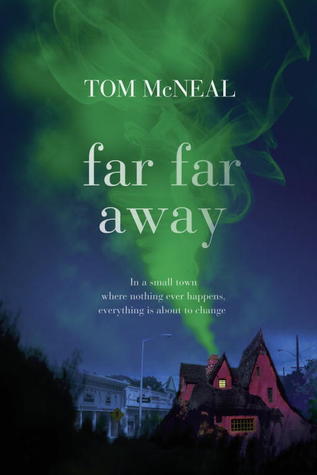 Creative narration, as it colors perspective, can add to a book’s appeal. Just as Death narrates Markus Zuzak’s The Book Thief, which offers a perspective on the Jewish holocaust, and God narrates Alan Lightman’s Mr. g, a hypothesis about the universe’s creation, the ghost of Jacob Grimm narrates Tom McNeal’s new book, Far Far Away.
Creative narration, as it colors perspective, can add to a book’s appeal. Just as Death narrates Markus Zuzak’s The Book Thief, which offers a perspective on the Jewish holocaust, and God narrates Alan Lightman’s Mr. g, a hypothesis about the universe’s creation, the ghost of Jacob Grimm narrates Tom McNeal’s new book, Far Far Away.
Although the story doesn’t begin “once upon a time” or “in a land far, far away,” McNeal’s recent release is a fairy tale. Set in the parochial village, Never Better, Far Far Away features heroes and heroines, villains and ogres, horrors and cruelties, as well as lessons for and truths about human nature. Never Better is famous for its Prince Cakes, pastries prepared by the Saint Nicholas-like baker from Sweden, Sten Blix, who dyes the bakery smoke green to signal the cake’s readiness.
Because of a thing undone, Jacob Grimm—whose life had been governed by fact and reason, work and routine—doesn’t cross over to the spirit world after death. Instead, he is trapped in Zwischenraum, the space between, where the troubled remain, “those who are agitated and uneasy, still looking for the thing undone. . . some unknown yet unmet desire”(9). It is he who tells the tale of Ginger Boultinghouse and Jeremy Johnson Johnson, who—because he hears strange whisperings and possesses uncommon knowledge—is treated as a misfit and an outcast. Jeremy, who displays kindness—the purest form of heroism—learns that a person can do almost everything right for most of his life and then screw up one time, “and everybody thinks [he] drips slime” (96). He also learns that the appearance of doing something wrong can be as bad as actually doing it.
It is Jacob’s job to protect Jeremy from the Finder of Occasions, “someone who lies in wait until the opportunity is afforded to do harm or wreak havoc without leaving a trace behind” (70). Although Jacob doesn’t know whether this opportunist is the dwarfish Deputy McRaven, the bully Conk Crinklaw, the grief-stricken Mrs Truax, or someone without obvious villainous qualities, he is well aware how horrors can move hidden among us. The ghostly Grimm also feels sorry for those who focus on flaws and faults and cannot see our better natures.
True to the genre, McNeal’s tale features enchantments and dungeons and potions and forbidden rooms, and nothing is too cruel to be true.
- Posted by Donna

